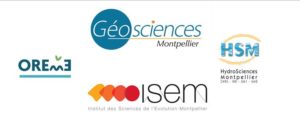Training
The department offers the following courses:
- Earth-Water-Environment bachelor's degree(ST) bachelor's degree, which is designed to offer students a gradual orientation towards general courses leading to a master's degree, or professional courses for rapid professional integration.
- Master in Earth and Planetary Sciences, Environment(STPE) comprising 4 courses:
Geological Hazards - Observations, Measurements, Modelling
AWARE IDIL Earth
Geodynamics and Geomaterials
Exploration and Reservoir Geology - Master in Water Sciences 6 courses:
Water Resources
Water and Coastal
Water and Agriculture
Contaminants Water Health
Water and Society
AWARE IDIL Water Master Earth and Water Under Global Change (IDIL)A two-year international Master's program to familiarize students with the world of research, in collaboration with research laboratories at the University of Montpellier, integrated into the STPE and EAU specializations.
He also takes part in training courses:
- Biology-Ecology degree,
- of the BEE master's degree in paleontology,
- Energy master's degree,
- Master MEEF(Métiers de l'Enseignement, de l'Education et de la Formation, preparation for the CAPES SVT competitive examination),
- ACCES master's degree(Animation, Culture, Enseignements Scientifiques, preparation for the Agrégation SVT),
- anengineering degreefrom the Ecole des Mines d'Alès,
- and the Water Environment Oceonography master's program at Hanoi University of Science and Technology(USTH),
- and preparation for the SVT internal agrégation competitive examination - in conjunction with theMontpellier Academy.
The three laboratories that support the Earth - Water - Environment department at Montpellier are joint research units with national and international reach. All three are members of the Observatoire de Recherche Méditerranéen de l'Environnement (OSU-OREME).Géosciences Montpellier (GM)develops its research on terrestrial dynamics and its surface manifestations, taking into account interactions between the different terrestrial envelopes. Its supervisory bodies are UM, CNRS and the University of the West Indies.HydroSciences Montpellier (HSM)develops research ranging from the study of the hydrological cycle of surface and underground aquatic systems to the effects of global change on water resources.TheInstitut des Sciences de l'Evolution de Montpellier (ISEM)conducts research into the origins and dynamics of biodiversity, as well as the methods and mechanisms of its evolution. Its supervisory bodies are the UM, CNRS, IRD and EPHE.
